Poetry Thursday: How Amrita Pritam's romance seduced my poetry
In keeping with Poetry Thursday's theme on why a poetry liner from another poet would influence my own work, here is my story of Amrita Pritam, the late Punjabi poetess consumed with passion and a courage to defy the norm and how her magic resonated with me. These are the strange lines that first danced in my head and started me on my own journey.
"There was a grief,
I smoked in silence, like a cigarette
only a few poems fell out of the ash
I flicked from it."
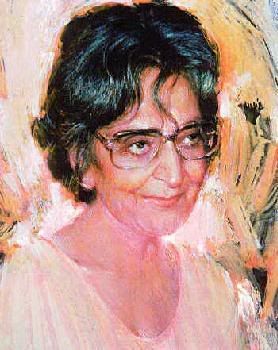
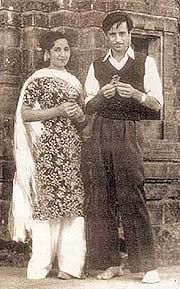
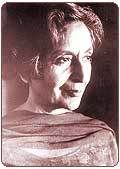
Amrita Pritam together with her faithful lover of many years, Imroz.
The prominent grand dame of Punjabi letters together with her fiery, passionate poetry and the doyenne of its country's literature, Amrita Pritam, passed away last October 31 (2005) at 86. By then, she had earned herself orbituaries in several world newspapers.
Pritam once declared that love meant admiration of a woman's mind and body!
"A woman should come to a man as body, stressed Pritam. ...as a poem and as a person all-blended and fused into one total being. She does not chide the male ego in the process."
Man, she went on to hint, was a hunter, as evolution put him on the highways of time and space. Woman was then a transmitter of knowledge. Yes, from the very prenatal state, the female had to tell a child - what was wind and storm, tree and bird, and what was an apple and snake, long before a holy book said it in so many words.
"No one", finished Pritam, "has ever peeled a woman."
At the end of the day for me, observing Pritam as an aspiring poet, so long ago and from so far away when I had not yet started to write serious poetry, travelled or seen the world, it was all so personal.
Here was a woman who had earned world respect in every sense of the word.
She essayed through prose and poetry, the gory events of the Partition, earned herself admiration from both sides of the feuding Punjab, won herself awards a-plentiful, authored over a 100 books with her first poetry collection being rocketed into fame at just 16 and had her works translated into several languages including French, Danish and the Japanese.
Her best known novel, The Skeleton was later made into a powerful Hindi film called Pinjar in 2003. It dealt with survival and hope despite chaotic riots, displacement of families and human suffering. (please see pictures below).


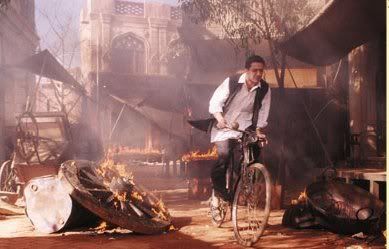
And this is for if you want to catch a quick whiff from her breath of poetry:
Who will ever stitch a torn phulkari of light?
In the niche of the sky the sun lights a lamp.
But who will ever light a lamp
On the parapet of my heart... - Amrita Pritam -
And Pritam would have known a solid thing or two about romance. The petite poetess (she was barely 5 ft tall) was described as precocious from young.
For her lover the writer Imroz (pictured above and not Muslim inspite of his name) who devoted most of his life to her until the moment of her final fading breath, "he painted her eyes everywhere on walls and doors", and when ailing, she was finally unable to move, he looked after her to the last.
Pritam already had children; her daughter, Kundala and son, Navraj from an early broken marriage.
The thing is Pritam confessed to being in love passionately and intensely only once in her life and this unfortunately, had nothing to do with the star-struck Imroz.

Pritam's autobiography titled Rashidi Tickat or The Revenue Stamp
Pritam who once took to cutting off a great chunk of her hair and smoking heavily in a show of defiance, was known to be head-over-heels in love for most of her years, with the charismatic lyricist/poet of an incredibly great stature, whose name was Sahir Ludhianvi.
Ludhianvi already had a wife and other women.
The famous songwriter of Bollywood films (an industry that would complete Pritam's fascination with fantasy - she loved all things Bollywood), who passed away in 1981, was known to be a heavy drinker and to shout profanities rudely and loudly when things didn't go his way. He died after suffering a heart attack while playing cards.
Pritam had met him for the first time at a press conference.
She took to immediately scribbling his name excessively all over her palm, fingers, wrists and on bits of paper. She even asked him to autograph her palm, "promising never to wash the signature off."
Ludhianvi on the other hand, stayed attracted to Pritam in a cold, silent way. He said nothing, just stared at her, in what I suspect today to be in the most sensual fashion, puffing away at cigarette after cigarette.
After he left, Pritam smoked all the crumpled butts that were hastily rescued from the ashtray!
This was the start of something electrifying yet bizarre.
Ludhianvi would visit Pritam, continue to say nothing, but to sit in front of her, looking straight into her eyes, smoking cigarette after cigarette. Then he would get up without a word to go.
Pritam who nurtured this lifelong crush with the fragility of a diamond, would stare in morbid fascination.
Later, she wrote some of her best poetry based on this strange but highly-seductive encounters. The poem described her fantasy lover's every body language and slight movement and it was clear how she adored each memory.
"There was a grief,
I smoked in silence, like a cigarette
only a few poems fell out of the ash
I flicked from it."
I first began to read this poetry that was published by Femina Magazine in Mumbai, India.
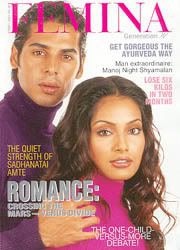 Femina is known to be the equivalent of India's fashionable Vogue. The stylish read was edited at the time, by Vimla Patil in Mumbai. Femina was also responsible for sponsoring the Miss India/Miss Universe/World competitions and I believe, it still is. The magazine held all the right ingredients for a winning mix of the glamorous and artistic.
Femina is known to be the equivalent of India's fashionable Vogue. The stylish read was edited at the time, by Vimla Patil in Mumbai. Femina was also responsible for sponsoring the Miss India/Miss Universe/World competitions and I believe, it still is. The magazine held all the right ingredients for a winning mix of the glamorous and artistic.
Patil chose a fabulous picture of Pritam to go with her poetry. The poet posed with a natural sophisticated flair, lying back slightly on a wicker chair with legs crossed, one hand thrown backwards while balancing a cigarette and penetrating almond-shaped eyes that were without a doubt, bent on seducing the camera.
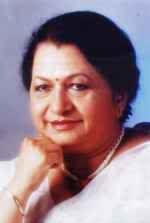 Vimla Patil today: One of India's most senior journalists and who edited Femina magazine for 25 years in Mumbai. Patil was the first editor abroad to recognise my own poetry potential. (I am Malaysian) just before my poems were accepted by literary presses in England at the time.
Vimla Patil today: One of India's most senior journalists and who edited Femina magazine for 25 years in Mumbai. Patil was the first editor abroad to recognise my own poetry potential. (I am Malaysian) just before my poems were accepted by literary presses in England at the time.
For a little while and knowing nothing of the tale, I became obsessed by Pritam's verses.
Recognising them to be different from anyone else's I began to savour her words slowly, letting them rest in my mind and reflecting on her own emotions before it dawned on me that I should try writing my poetry again in a serious way after a long hiatus from my school years.
I was never trained to write poetry but it appeared that through Pritam's own passion for Ludhianvi's smoking fetishes, she was slowly guiding me in that subconscious way as to a new knowledge on embracing the right rhythm, tone and pace for a love poem. I begged inwardly to reach her deepest secrets, that were so profoundly wound into her lines.
In other words, I learnt from her by ear.
I was already at the time, reading the British poets in what was known as the Movement comprising a special group that was made up of Sylvia Plath, Randal Jarrell, Ted Hughes, Kingsley Amis and many others. I related to Plath the best.
Something - I'll never know what - about Pritam's stylish elegance and the pride she took with her verses convinced me that I too, could make a go of it if I wanted. After awhile, I summed up enough courage to send a few on to, Ms. Vimla Patil at Femina. Patil responded quickly - she had selected 3 poems out of 5. Later, she would take more, of course.
But at the time, I was ecstatic.
Then I began to send them on to England. There must have been a rare star milling around somewhere. It was a time of acceptances and not rejections.
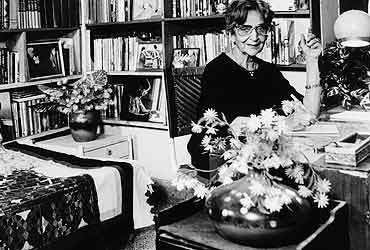
Pritam photographed by Outlook Magazine
I often wonder at the turn my destiny would have taken if I had pursued this passion and not simply stopped for years. I don't think it's too late now - there's still a tomorrow and the same editors are all around, though they've commanded striking portfolios by now.
It's funny when I heard of Pritam's death last year - I remembered thinking I know this lady from somewhere and then it all came back again. At the end of the day, she was very much the root of my small successes.
Diamonds mixed with mud for the years to follow when I felt unable to write, yet now I'm on another path, writing my book. Again, my long and winding road retraces itself back to the same forgotten years.
And if my fiction ever gets published, Pritam and what she inspired in me, would still trail the root of this accomplishment. In this respect, I succumb to joy that such a good slice of that precious past was mine and perhaps most of all, that it can never be changed.
"I will meet you yet again
How and where I know not
Perhaps I will become a figment of your imagination
and maybe spreading myself
in a mysterious line
on your canvas
I will keep gazing at you.
Perhaps I will become a ray
of sunshine to be
embraced by your colours
I will paint myself on your canvas
I know not how and where —but I will meet you for sure.
Maybe I will turn into a spring
and rub foaming
drops of water on your body
and rest my coolness on
your burning chest
I know nothing
but that this life
will walk along with me.
When the body perishes
all perishes
but the threads of memory
are woven of enduring atoms
I will pick these particles
weave the threads
and I will meet you yet again." - amrita pritam -
Translated from the Punjabi by Nirupama D
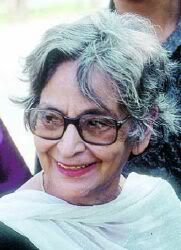
"There was a grief,
I smoked in silence, like a cigarette
only a few poems fell out of the ash
I flicked from it."



Amrita Pritam together with her faithful lover of many years, Imroz.
The prominent grand dame of Punjabi letters together with her fiery, passionate poetry and the doyenne of its country's literature, Amrita Pritam, passed away last October 31 (2005) at 86. By then, she had earned herself orbituaries in several world newspapers.
Pritam once declared that love meant admiration of a woman's mind and body!
"A woman should come to a man as body, stressed Pritam. ...as a poem and as a person all-blended and fused into one total being. She does not chide the male ego in the process."
Man, she went on to hint, was a hunter, as evolution put him on the highways of time and space. Woman was then a transmitter of knowledge. Yes, from the very prenatal state, the female had to tell a child - what was wind and storm, tree and bird, and what was an apple and snake, long before a holy book said it in so many words.
"No one", finished Pritam, "has ever peeled a woman."
At the end of the day for me, observing Pritam as an aspiring poet, so long ago and from so far away when I had not yet started to write serious poetry, travelled or seen the world, it was all so personal.
Here was a woman who had earned world respect in every sense of the word.
She essayed through prose and poetry, the gory events of the Partition, earned herself admiration from both sides of the feuding Punjab, won herself awards a-plentiful, authored over a 100 books with her first poetry collection being rocketed into fame at just 16 and had her works translated into several languages including French, Danish and the Japanese.
Her best known novel, The Skeleton was later made into a powerful Hindi film called Pinjar in 2003. It dealt with survival and hope despite chaotic riots, displacement of families and human suffering. (please see pictures below).



And this is for if you want to catch a quick whiff from her breath of poetry:
Who will ever stitch a torn phulkari of light?
In the niche of the sky the sun lights a lamp.
But who will ever light a lamp
On the parapet of my heart... - Amrita Pritam -
And Pritam would have known a solid thing or two about romance. The petite poetess (she was barely 5 ft tall) was described as precocious from young.
For her lover the writer Imroz (pictured above and not Muslim inspite of his name) who devoted most of his life to her until the moment of her final fading breath, "he painted her eyes everywhere on walls and doors", and when ailing, she was finally unable to move, he looked after her to the last.
Pritam already had children; her daughter, Kundala and son, Navraj from an early broken marriage.
The thing is Pritam confessed to being in love passionately and intensely only once in her life and this unfortunately, had nothing to do with the star-struck Imroz.

Pritam's autobiography titled Rashidi Tickat or The Revenue Stamp
Pritam who once took to cutting off a great chunk of her hair and smoking heavily in a show of defiance, was known to be head-over-heels in love for most of her years, with the charismatic lyricist/poet of an incredibly great stature, whose name was Sahir Ludhianvi.
Ludhianvi already had a wife and other women.
The famous songwriter of Bollywood films (an industry that would complete Pritam's fascination with fantasy - she loved all things Bollywood), who passed away in 1981, was known to be a heavy drinker and to shout profanities rudely and loudly when things didn't go his way. He died after suffering a heart attack while playing cards.
Pritam had met him for the first time at a press conference.
She took to immediately scribbling his name excessively all over her palm, fingers, wrists and on bits of paper. She even asked him to autograph her palm, "promising never to wash the signature off."
Ludhianvi on the other hand, stayed attracted to Pritam in a cold, silent way. He said nothing, just stared at her, in what I suspect today to be in the most sensual fashion, puffing away at cigarette after cigarette.
After he left, Pritam smoked all the crumpled butts that were hastily rescued from the ashtray!
This was the start of something electrifying yet bizarre.
Ludhianvi would visit Pritam, continue to say nothing, but to sit in front of her, looking straight into her eyes, smoking cigarette after cigarette. Then he would get up without a word to go.
Pritam who nurtured this lifelong crush with the fragility of a diamond, would stare in morbid fascination.
Later, she wrote some of her best poetry based on this strange but highly-seductive encounters. The poem described her fantasy lover's every body language and slight movement and it was clear how she adored each memory.
"There was a grief,
I smoked in silence, like a cigarette
only a few poems fell out of the ash
I flicked from it."

I first began to read this poetry that was published by Femina Magazine in Mumbai, India.
 Femina is known to be the equivalent of India's fashionable Vogue. The stylish read was edited at the time, by Vimla Patil in Mumbai. Femina was also responsible for sponsoring the Miss India/Miss Universe/World competitions and I believe, it still is. The magazine held all the right ingredients for a winning mix of the glamorous and artistic.
Femina is known to be the equivalent of India's fashionable Vogue. The stylish read was edited at the time, by Vimla Patil in Mumbai. Femina was also responsible for sponsoring the Miss India/Miss Universe/World competitions and I believe, it still is. The magazine held all the right ingredients for a winning mix of the glamorous and artistic.Patil chose a fabulous picture of Pritam to go with her poetry. The poet posed with a natural sophisticated flair, lying back slightly on a wicker chair with legs crossed, one hand thrown backwards while balancing a cigarette and penetrating almond-shaped eyes that were without a doubt, bent on seducing the camera.
 Vimla Patil today: One of India's most senior journalists and who edited Femina magazine for 25 years in Mumbai. Patil was the first editor abroad to recognise my own poetry potential. (I am Malaysian) just before my poems were accepted by literary presses in England at the time.
Vimla Patil today: One of India's most senior journalists and who edited Femina magazine for 25 years in Mumbai. Patil was the first editor abroad to recognise my own poetry potential. (I am Malaysian) just before my poems were accepted by literary presses in England at the time.For a little while and knowing nothing of the tale, I became obsessed by Pritam's verses.
Recognising them to be different from anyone else's I began to savour her words slowly, letting them rest in my mind and reflecting on her own emotions before it dawned on me that I should try writing my poetry again in a serious way after a long hiatus from my school years.
I was never trained to write poetry but it appeared that through Pritam's own passion for Ludhianvi's smoking fetishes, she was slowly guiding me in that subconscious way as to a new knowledge on embracing the right rhythm, tone and pace for a love poem. I begged inwardly to reach her deepest secrets, that were so profoundly wound into her lines.
In other words, I learnt from her by ear.
I was already at the time, reading the British poets in what was known as the Movement comprising a special group that was made up of Sylvia Plath, Randal Jarrell, Ted Hughes, Kingsley Amis and many others. I related to Plath the best.
Something - I'll never know what - about Pritam's stylish elegance and the pride she took with her verses convinced me that I too, could make a go of it if I wanted. After awhile, I summed up enough courage to send a few on to, Ms. Vimla Patil at Femina. Patil responded quickly - she had selected 3 poems out of 5. Later, she would take more, of course.
But at the time, I was ecstatic.
Then I began to send them on to England. There must have been a rare star milling around somewhere. It was a time of acceptances and not rejections.

Pritam photographed by Outlook Magazine
I often wonder at the turn my destiny would have taken if I had pursued this passion and not simply stopped for years. I don't think it's too late now - there's still a tomorrow and the same editors are all around, though they've commanded striking portfolios by now.
It's funny when I heard of Pritam's death last year - I remembered thinking I know this lady from somewhere and then it all came back again. At the end of the day, she was very much the root of my small successes.
Diamonds mixed with mud for the years to follow when I felt unable to write, yet now I'm on another path, writing my book. Again, my long and winding road retraces itself back to the same forgotten years.
And if my fiction ever gets published, Pritam and what she inspired in me, would still trail the root of this accomplishment. In this respect, I succumb to joy that such a good slice of that precious past was mine and perhaps most of all, that it can never be changed.
"I will meet you yet again
How and where I know not
Perhaps I will become a figment of your imagination
and maybe spreading myself
in a mysterious line
on your canvas
I will keep gazing at you.
Perhaps I will become a ray
of sunshine to be
embraced by your colours
I will paint myself on your canvas
I know not how and where —but I will meet you for sure.
Maybe I will turn into a spring
and rub foaming
drops of water on your body
and rest my coolness on
your burning chest
I know nothing
but that this life
will walk along with me.
When the body perishes
all perishes
but the threads of memory
are woven of enduring atoms
I will pick these particles
weave the threads
and I will meet you yet again." - amrita pritam -
Translated from the Punjabi by Nirupama D



<< Home